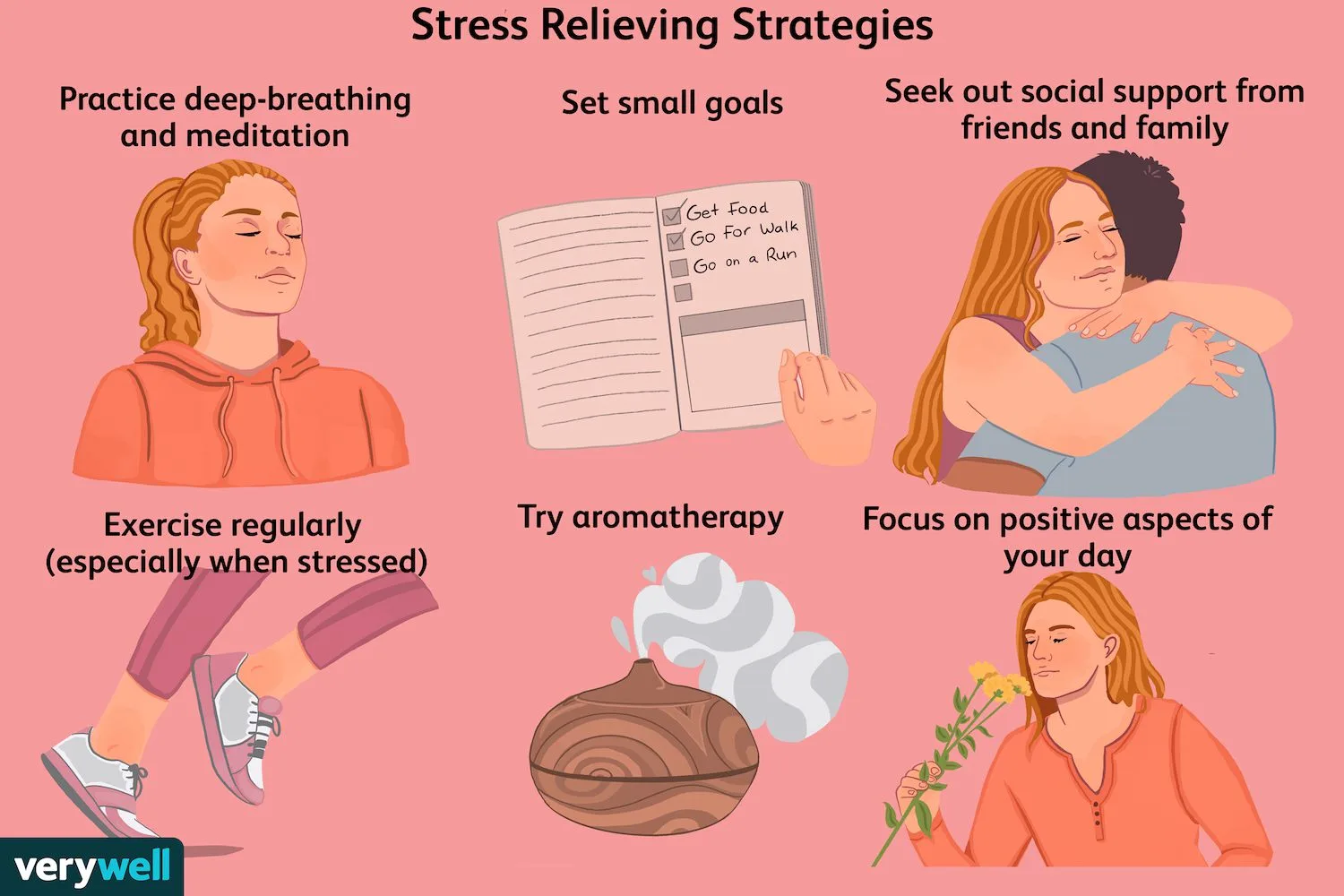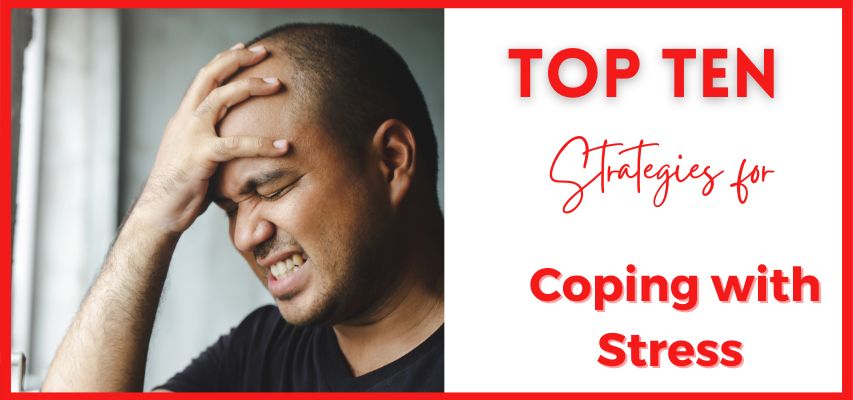Coping with stress can be very difficult. According to the American Psychological Association, stress can hurt our mental and physical health, affecting our general well-being, whether it is brought on by work pressures, personal difficulties, or everyday chores. Although a little stress can be beneficial under certain circumstances, persistent and severe stress can cause a variety of health problems, including anxiety, depression, heart disease, and a weakened immune system. Stress is the body’s natural response to demanding situations.
The good news is that there are many effective ways to manage stress and maintain a healthy and fulfilling existence. In this article, we’ll explore the top ten strategies that can help you manage stress, build resilience, and boost your overall well-being.
Also, read: Ten Things You Should Know About Bipolar Disorder
Conquer Stress: 10 Powerful Techniques for Lasting Calm
Feeling overwhelmed by stress? Discover the top ten effective strategies for managing and coping with stress in your daily life. From relaxation techniques and exercise to time management and social support, this comprehensive guide will help you reduce stress and improve your overall well-being.

1. Practice Mindfulness and Meditation
Effective methods for reducing stress and promoting relaxation include mindfulness and meditation. Being mindful means accepting your thoughts and feelings without judgment and being completely present at the moment. You can now focus on the present, notice your emotions without absorbing them, and develop a sense of calm by setting aside some time each day to practice mindfulness. On the other hand, meditation requires intense focus and attention. According to studies, daily meditation can promote a positive outlook and reduce levels of the stress hormone cortisol. To better manage your stress, incorporate mindfulness and meditation into your daily practice.
Also, read: Ten Spiritual Facts to Deepen Your Inner Journey
2. Engage in Regular Physical Activity
In addition to being good for your physical health, exercise is essential for managing stress. Exercise releases endorphins, the “feel-good” hormones, and can improve your mood and reduce tension and anxiety. Regular exercise has been shown to boost cognitive performance, increase self-esteem, and improve sleep quality. Engage in activities you enjoy, such as yoga, cycling, swimming, jogging, or brisk walking. To experience the stress-reducing benefits of exercise, aim for at least 30 minutes of moderate-intensity activity most days of the week.
Also, read: Ten reasons to eat fruits and vegetables
3. Establish Healthy Sleep Habits
To manage stress effectively and maintain overall well-being, you need to get good sleep. Chronic stress can interfere with sleep cycles, making it difficult to achieve the recommended 7-9 hours of sleep per night. Stress levels can increase, and it can be challenging to cope with daily pressures when you are not getting enough sleep. Establishing a calming nighttime ritual that tells your body it’s time to wind down will help you sleep better. Stay away from stimulants like caffeine and technology before bed, and make your bedroom more pleasant to promote restful sleep.
Also, read: Top 10 healthiest foods to eat
4. Prioritize Time Management
By reducing feelings of confusion, effective time management can reduce stress. Create a daily schedule or to-do list to prioritize tasks and allocate time to different activities. To keep your commitments, break down major tasks into smaller, achievable steps and avoid procrastination. Time management not only keeps you organized but also allows you to identify and get rid of unnecessary responsibilities, giving you more time for leisure and self-care.
Also, read: Top 10 ways to connect with spirituality
5. Seek Social Support
Talking to friends, family, or a support network can provide emotional relief and reduce stress levels. Social support provides a sense of belonging and reduces feelings of isolation. Sharing your thoughts and feelings with someone you trust can offer perspective and validation, reminding you that you are not alone in your challenges. Engage in meaningful social connections and surround yourself with positive and supportive individuals who can offer a listening ear and practical help during stressful times.
Also, read: Ten Facts about physical-health
6. Practice Deep Breathing Techniques
Deep breathing exercises can help you relax your nervous system when your stress levels rise. Deep breathing triggers the body’s relaxation response, lowering blood pressure and heart rate. Breathe in slowly and deeply, in through your nose, and out through your mouth. This can be done anywhere to help you regain control of your emotions and thoughts, whether it’s at work, at home, or during a stressful scenario.
Also, read: Top 10 Things to Know About Zurzuvae, the New Fast-Acting Pill for Postpartum Depression
7. Limit Exposure to Stressful Triggers
Identify the things in your life that stress you out, and try to limit your exposure to those things. This may include setting limits, developing the ability to refuse additional commitments, or avoiding circumstances known to lead to high stress. While it may not always be possible to completely avoid stressors, being aware of your stress triggers and taking proactive steps to manage them can significantly reduce your stress levels.
Also, read: Top 10 Side Effects of Zurzuvae, the New Fast-Acting Pill for Postpartum Depression
8. Engage in Relaxation Activities
Taking part in enjoyable and relaxing activities can help reduce the negative effects of stress. Make time for the interests and pastimes that give you a sense of fulfillment and peace. These hobbies, such as reading a book, gardening, listening to music, or spending time in nature, might help you unwind and manage stress more skillfully. Sometimes the best defense against stress is a good dose of relaxation. There are many ways to unwind, so find what works for you! Take a warm bath with calming essential oils, curl up with a good book, or listen to soothing music. Let your body unwind with gentle stretches or progressive muscle relaxation. If you prefer something creative, try coloring, painting, or playing a musical instrument. The key is to find an activity that helps you de-stress and disconnect from your daily worries.
Also, read: Top Ten Foods to Boost Your Immune System Naturally
9. Adopt a Healthy Diet
A healthy and well-balanced diet can be quite helpful in reducing stress. Limit your intake of sugar, caffeine, and processed foods, as these can all increase anxiety. To increase your body’s ability to handle stress, focus on incorporating fruits, vegetables, whole grains, lean protein, and healthy fats into your diet. A nutritious diet nourishes your body by supplying the nutrients it needs to maintain your overall health and resistance to stress.
Also, read: Ten Tips For Eating a Healthy Diet
10. Consider Professional Support
Don’t be afraid to seek help from a counselor or therapist if stress starts to affect your daily life and becomes unbearable. Professional counseling can offer helpful resources and coping mechanisms tailored to your specific situation. A licensed mental health professional can help you identify the main sources of your stress, develop healthy coping strategies, and offer emotional support when the going gets tough.
Also, read: Ten Best Ways to Lose Weight
Some Statistics on strategies for coping with stress
- 30% of older people said they never felt overwhelmed or unable to cope in the past year, compared to 7% of young adults.
- 46% said they ate too much or ate unhealthy because of stress.
- 29% said they had started drinking or increased their drinking, and 16% said they had started smoking or increased their smoking.
- 51% of adults who felt stressed reported feeling depressed, and 61% reported feeling anxious.
- Of the people who reported experiencing stress at some point in their lives, 16% self-harmed, and 32% reported having suicidal thoughts and feelings.
- 37% of adults who reported feeling stressed said they felt lonely as a result.
- 36% of all adults who reported stress in the previous year cited their own or a friend’s or relative’s long-term health condition as a factor. This rose to 44% of adults over 55.
- Of those who reported feeling stressed in the past year, 22% cited debt as a stressor.
- Of the people who reported high levels of stress, 12% said that feeling the need to respond to messages immediately was a stressor.
- 49% of 18- to 24-year-olds who experienced high levels of stress believed that comparing themselves to others was a source of stress, which was higher than any of the older age groups.
- 36% of women who felt high levels of stress linked it to their appearance and body image, compared to 23% of men.
- Housing worries are a major source of stress for younger people (32% of 18- to 24-year-olds cited it as a source of stress in the past year). This is less for older people (22% aged 45–54 and only 7% aged over 55).
- Younger people have higher stress related to the pressure to succeed. 60% of 18-24-year-olds and 41% of 25-34-year-olds reported this, compared to 17% of 45-54-year-olds and 6% of those over 55.
Also, read: Ten Tips For Living a Healthy Lifestyle
FAQs ON strategies for coping with stress
Q. What are the signs and symptoms of stress?
- Feeling anxious or worried
- Having trouble sleeping
- Feeling tired
- Having headaches or muscle tension
- Having difficulty concentrating
- Feeling irritable or angry
- Changes in appetite
Q. How can I tell if I’m healthily coping with stress?
If you’re able to manage your stress levels without interfering with your daily life, then you’re probably coping in a healthy way. However, if your stress is causing you to have trouble sleeping, concentrating, or interacting with others, then you may need to develop some healthier coping mechanisms.
Also, read: Top Ten Tips to Detox Your Body and Mind
Q. What are some unhealthy ways to cope with stress?
- Drinking alcohol or using drugs
- Eating unhealthy foods
- Smoking
- Avoiding your problems
- Procrastinating
- Isolating yourself from others
Q. What are some healthy ways to cope with stress?
- Exercise
- Relaxation techniques
- Spending time with loved ones
- Doing something you enjoy
- Talking to a therapist
Q. How can mindfulness help in coping with stress?
Mindfulness involves being fully present at the moment and accepting your thoughts and emotions without judgment. It can reduce stress by promoting relaxation and creating a sense of calm.
Also, read: Top Ten Benefits of Yoga for Your Physical and Mental Wellbeing
Q. What are the physical benefits of regular exercise in stress management?
Regular exercise releases endorphins, which act as natural stress relievers and can elevate your mood. It also helps in reducing cortisol levels, the stress hormone, and promotes overall physical and mental well-being.
Q. How does social support help in managing stress?
Social support provides emotional relief and a sense of belonging, reducing feelings of isolation and stress. Talking to friends or family can offer perspective and validation, reassuring you that you’re not alone in facing challenges.
Conclusion
Life will inevitably involve stress, but it doesn’t have to rule our lives. By adopting these top 10 stress reduction techniques in your daily life, you can improve your overall well-being, build resilience, and reduce stress. Keep in mind that everyone’s journey is different, so it’s important to find out what works best for you. Don’t be afraid to ask for help when you need it, and be kind to yourself when you face life’s struggles. Even when you’re stressed, you can thrive and live a more balanced and fulfilling life with the right skills and attitude.
Also, Read: Top Ten Strategies to Overcome Secondary Traumatic Stress


































